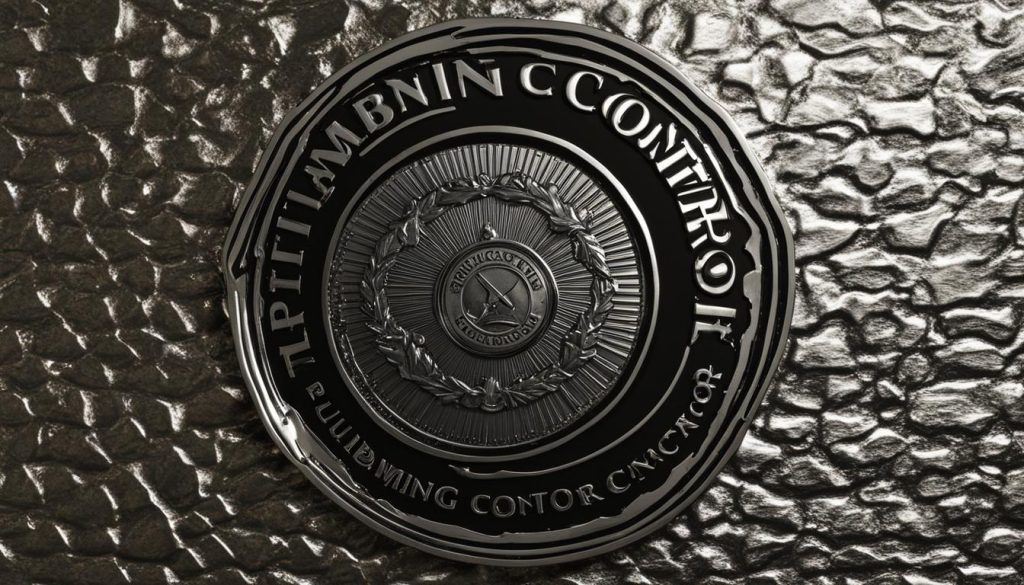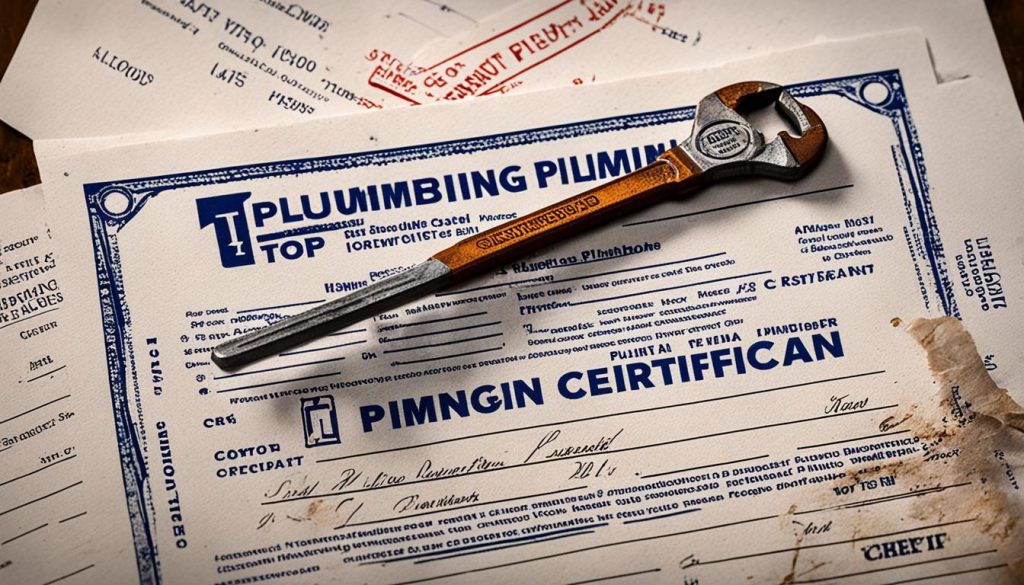Get Your Illinois Plumbing License Today!
Did you know that in the great state of Illinois, there are over 11,000 licensed plumbers and apprentice plumbers? That’s right, the plumbing trade is thriving in Illinois, and if you’re considering a career as a plumber, now is the perfect time to get your Illinois plumbing license!
The Illinois Department of Public Health regulates the plumbing industry to ensure the safety and well-being of the public. Licensed plumbers are required to pass a state licensing exam after working as an apprentice plumber for several years, gaining valuable experience and expertise.
Key Takeaways:
- Illinois has over 11,000 licensed plumbers and apprentice plumbers.
- Getting a plumbing license in Illinois is regulated by the Illinois Department of Public Health.
- Plumbers must pass a state licensing exam after working as an apprentice.
- Having a plumbing license in Illinois opens up more job opportunities and earning potential.
- Licensed plumbers are required to complete continuing education to stay updated on industry advancements.
Requirements for Obtaining a Plumbing License in Illinois
To become a plumber in Illinois, there are specific requirements that individuals need to meet. Here is an overview of the steps involved in obtaining a plumbing license in Illinois:
- Age and Education: Applicants must be at least 16 years old and have completed at least 2 years of high school.
- Educational Course: Individuals must complete an approved course instruction through a college, university, or trade school. This education provides the necessary knowledge and skills required for the plumbing trade.
- Application and Examination: After completing the educational course, applicants must submit a “Plumber’s License: Application for Examination” form. Upon submission, they will be required to pass the state licensing exam, which consists of a written and practical component.
- Fees: In order to proceed with the licensing process, applicants are required to pay the application and examination fees. These fees vary and must be paid at the time of application.
By meeting these requirements and successfully completing the licensing process, individuals can obtain a plumbing license in Illinois and embark on a rewarding career in the plumbing industry.
| Requirements for Obtaining a Plumbing License in Illinois | |
|---|---|
| Age | At least 16 years old |
| Education | Completed at least 2 years of high school |
| Educational Course | Completed approved course instruction through a college, university, or trade school |
| Application and Examination | Submitted “Plumber’s License: Application for Examination” form and passed the state licensing exam (written and practical components) |
| Fees | Paid the required application and examination fees |
Licensing Requirements for Apprentice Plumbers
If you’re looking to kickstart your plumbing career in Illinois, becoming an apprentice plumber is an excellent first step. To become an apprentice plumber in the state, there are several requirements you need to meet:
- Age Requirement: You must be at least 16 years old to apply for an apprentice plumber license.
- Sponsorship: You need to have sponsorship from a licensed plumber or an approved apprenticeship program. This allows you to gain hands-on training and practical experience under the guidance of an experienced professional.
- Apprenticeship Period: The maximum apprenticeship period is 6 years. It is essential to complete the required number of hours and gain the necessary skills during this period to set a strong foundation for your plumbing career.
- Plumbing Licensing Exam: After completing your apprenticeship, you must apply for the plumbing licensing exam. Failing to apply for the exam or failing the exam will make you ineligible for a renewal of the apprentice license.
Notice of Cancellation of Employment/Supervision
In the event that your sponsoring licensed plumber terminates your apprenticeship, you must complete and submit the “Apprentice Plumber: Notice of Cancellation of Employment/Supervision” form to the Department. This ensures that the Department is aware of any changes in your apprenticeship status.
Throughout your apprenticeship, you will need to complete the required coursework and work under a licensed plumber for at least 4 years. This hands-on experience will provide you with the practical skills and knowledge necessary to become eligible for a plumbing license in Illinois.
Becoming an apprentice plumber is an important stepping stone towards obtaining your plumbing license. It allows you to learn from experienced professionals in the field and gain the practical skills required to excel in the plumbing trade.
Licensing Requirements for Plumbing Contractors
As a plumbing contractor in Illinois, it is crucial to understand the licensing requirements to operate your business legally. Here are the key steps to obtaining a plumbing contractor license in Illinois:
1. Register and Pay Fees
To get started, you need to register your plumbing contractor business with the state of Illinois. This involves completing the “Plumbing Contractors: Application for Registration” form. Additionally, you will need to pay an annual fee to maintain your registration.
2. Maintain Insurance Coverage
As a plumbing contractor, you are required to maintain specific insurance coverages to protect your business and clients. These include:
- General liability insurance
- Bodily injury insurance
- Property damage insurance
- Worker’s compensation insurance
Having adequate insurance coverage demonstrates your commitment to operating a responsible plumbing business.
3. Small Business Insurance
If you own your own plumbing business, it’s important to have additional small business insurance. This insurance protects your business assets and provides coverage for potential risks specific to running a small business.
By fulfilling these licensing requirements, you can establish yourself as a reputable plumbing contractor in Illinois, ensuring that you operate legally and responsibly.
Licensing Requirements for Irrigation Contractors
In Illinois, irrigation contractors must register annually with the Department of Public Health. This registration ensures that contractors meet the necessary qualifications and adhere to state regulations. Employers are also required to register all employees who install or supervise the installation of lawn sprinkler systems.
Registration applications and fees vary depending on factors such as the number of employees and the scope of work. The Department of Public Health provides the necessary forms and guidelines for the registration process. Applicants must ensure they complete all required documentation accurately and submit the appropriate fees.
One specific form that applicants must complete is the “Irrigation Contractors: Application Child Support Certification” form. This form certifies whether the applicant is delinquent in the payment of child support. It is an essential step in the registration process and helps to ensure that contractors meet their financial obligations.
Additionally, the law requires employers to inform the Department of Public Health when the employment of an irrigation contractor is canceled. This helps maintain accurate records and ensures that contractors are in compliance with regulations.
By adhering to these licensing requirements, irrigation contractors in Illinois can demonstrate their professionalism and commitment to quality work. It also ensures that they are operating within the legal framework established by the state.
| Licensing Requirements for Irrigation Contractors | Details |
|---|---|
| Registration | Annual registration with the Department of Public Health |
| Employee Registration | All employees who install or supervise must be registered |
| Registration Applications and Fees | Varies based on factors such as number of employees and scope of work |
| “Irrigation Contractors: Application Child Support Certification” Form | Certifies payment status of child support |
| Employment Cancellation | Employers must inform the Department of Public Health |
Requirements for Obtaining a Retired Plumbing License
If you’re ready to retire from your plumbing career in Illinois and want to relinquish your responsibilities, you may be eligible for a retired plumbing license. This license allows you to officially retire and no longer practice plumbing in the state. To qualify for a retired plumbing license, you must meet the following criteria:
- Hold an active Illinois plumbing license
- Be at least 62 years old or physically unable to perform plumbing responsibilities
- Voluntarily surrender your current license
Once you obtain a retired plumbing license, there are a few restrictions to keep in mind. Retired plumbers cannot sponsor or supervise apprentice plumbers, as well as inspect plumbing projects. However, if you decide to return to the plumbing trade, you have the option to reinstate or restore your plumbing license at a lower cost.
Please note that the image above is provided for illustrative purposes only and does not represent the retired plumbing license in Illinois.
If you’re ready to retire from your plumbing career in Illinois and want to learn more about obtaining a retired plumbing license, contact the Illinois Department of Public Health for further assistance.
Benefits of Getting a Plumbing License in Illinois
Having a plumbing license in Illinois offers numerous benefits and advantages for aspiring plumbers. Not only is it a legal requirement to work in the plumbing trade, but it also serves as a testament to your experience, skill, and commitment to the profession.
One of the key advantages of having a plumbing license is the increased job opportunities and earning potential it provides. Licensed plumbers are highly sought after by residential and commercial clients who value the assurance of working with a qualified professional. With a license, you can expand your clientele, bid on more projects, and potentially secure higher-paying jobs.
In addition to the career advantages, a plumbing license protects both you and your customers. By ensuring proper plumbing practices, licenses help maintain industry standards and prevent potentially costly mistakes. This level of professionalism and expertise builds trust with clients, establishing a positive reputation for your business.
Furthermore, licensed plumbers have the freedom to operate their own business, advertise their services, and obtain commercial insurance. These perks not only provide autonomy and flexibility, but they also contribute to long-term success in the plumbing industry.
Source Links
- https://huckleberry.com/blog/illinois-plumbing-license/
- https://dph.illinois.gov/topics-services/environmental-health-protection/plumbing.html
- https://www.servicetitan.com/licensing/plumbing/illinois
- Investing Wisely: How Windows & Doors in Boost Property Value and Financial Health - April 24, 2025
- The Financial Impact of Personal Injuries: Why Legal Help Matters for Business Owners - April 16, 2025
- The Hidden Financial Costs of Domestic Assault: What Business Owners Need to Know - April 16, 2025













